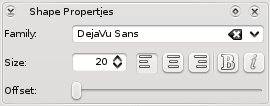Karbon/Tutorials/Artistic Text Shape/es: Difference between revisions
Created page with "{{Tip|Si un docker no es visible, puede dirigirse a <menuchoice>Settings -> Dockers</menuchoice> menu, o hacer click derecho en el título de otro contenedor y marcarlo para q..." |
Created page with "== Primer paso deformando texto ==" |
||
| Line 8: | Line 8: | ||
{{Tip|Si un docker no es visible, puede dirigirse a <menuchoice>Settings -> Dockers</menuchoice> menu, o hacer click derecho en el título de otro contenedor y marcarlo para que sea visible.}} | {{Tip|Si un docker no es visible, puede dirigirse a <menuchoice>Settings -> Dockers</menuchoice> menu, o hacer click derecho en el título de otro contenedor y marcarlo para que sea visible.}} | ||
== | == Primer paso deformando texto == | ||
{|class="tablecenter vertical-centered" | {|class="tablecenter vertical-centered" | ||
Revision as of 03:37, 9 October 2018
Este tutorial te mostrará lo que puedes hacer con el . Aunque este tutorial fue hecho para Karbon, las cosas funcionan de una manera muy similar en Calligra
In this lesson you will
- create a text shape
- associate a text shape with a path
Primer paso deformando texto
 |
To add an artistic text shape, go to the docker, click on the icon, and drag it to the canvas. |
After adding the shape, you might want to edit the text and display something more interesting. To do this, you need to activate the , either by double clicking on the newly created shape, or selecting  in the toolbox. Then you can change the text to something like this.
in the toolbox. Then you can change the text to something like this.

After changing the to "Steve", the to 30pt, and setting , you can have the following shape in your canvas:

Path follower
This is still a very straight, flat text. Now we want a curvy text. To do this, we will need to create a path, for instance, using the ![]() .
.
You should have something like this:

To associate the text with the curve, you need to activate the by double clicking on the text, or selecting  .
.
Then, if you move the mouse on top of the curve you will see the cursor changing to a hand, you will need to doubleclick on the curve to attach the path. Using the offset in the docker, you can adjust the text to get the following result:

You can detach the path by clicking on ![]() . You can , and the text. If you change the curve, then the text will be updated.
. You can , and the text. If you change the curve, then the text will be updated.


